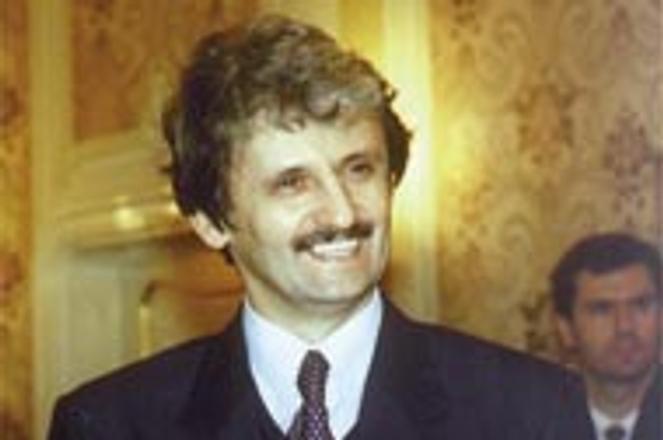Good neighbours. Czech Premier Miloš Zeman (left) came to Slovakia on November 23 to jump-start closer relations with Premier Mikuláš Dzurinda.Vladimír Hák-Profit
After a week of visits with Czech and Hungarian leaders and an appearance at a regional summit, Premier Mikuláš Dzurinda declared himself confident that the new Slovak government could mend fences with its neighbours, the Visegrad countries.
"After years of cooled relations among these countries and the recent political changes that have occured, the Visegrad group has found a new path towards western structures," said Ján Figeľ, the state secretary at the Foreign Ministry and Slovakia's main negotiator for EU entry. Figeľ predicted that the 'Visegrad Four', as Slovakia, Poland, Hungary and the Czech Republic are known, would be revived as an organisation after stagnating during the reign of former Slovak Premier Vladimír Mečiar.
The Visegrad Four is a political and economic association of post-communist countries in central Europe which co-operate for smoother accession to the EU and NATO. The idea was introduced in Bratislava at a 1990 summit of the then presidents of Hungary, Poland and the former Czechoslovakia. But after the 1993 Czechoslovak split and Slovakia's subsequent failure to maintain the pace of its neighbours towards Euro-Atlantic alliances, the idea of the Visegrad Four died out.
According to Figeľ, however, Slovakia will host a new summit of the Visegrad group countries in Bratislava in spring of 1999. "We will go back to where we always belonged," he said, adding that Slovakia's return to the group would have a significant impact on the destinies of all four Visegrad nations.
Fresh air
The first steps towards tightening regional ties came at the November 20-21 summit of the Central European Initiative (CEI) in Zagreb, Croatia. Dzurinda met personally with the leaders of Croatia, Ukraine, Slovenia, Romania, Bulgaria, Italy and the Czech Republic, promosing each that the Slovak cabinet would try to improve the international image of Slovakia by upholding democratic rules and standards.
"The new approach of the Slovak government is based on its will to move away from verbal declarations of the past to real actions," said Dzurinda at a press conference, adding that the cabinet believed its recent steps would enable Slovakia to join the first group of candidates for full-fledged EU membership.
A few days after the CEI summit, Hungarian Foreign Minister János Martónyi visited Bratislava on November 24. Martónyi and Slovak Foreign Minister Eduard Kukan signed a protocol to speed the implementation of the Basic Treaty between Slovakia and Hungary, which was originally signed in Paris on August 15, 1995 by the then Slovak and Hungarian Premiers, Vladimír Mečiar and Gyula Horn.
Based on the protocol, eleven joint commissions will be set up to monitor the implementation of various aspects of the treaty, which was blocked by the Mečiar cabinet.
"With the signing of the treaty, relations with Hungary deteriorated to a state even worse than when there was no such agreement between the countries," said Figeľ. According to the recent protocol, Slovakia and Hungary agreed to rebuild the only bridge on the Danube that was not rebuilt after World War II, the bridge between Esztergom in Hungary and Štúrovo in Slovakia.
Figeĺ added that the controversial Gabčíkovo-Nagymaros dam on the Danube River "will not be a political problem any longer." He said that both countries had agreed to abide by the 1997 verdict of the International Court of Justice in The Hague, according to which Hungary is obliged to honour a hydroelectric dam contract signed with Slovakia in 1977.
On November 23, it was the turn of the Czech government, led by Premier Miloš Zeman, to come to Bratislava to meet its Slovak counterpart. The premiers of the two countries pledged to reduce trade and financial barriers between them, and pointed out the importance of maintaining the international transport corridors that wind through their nations.
The premiers also agreed to renew the Czech and Slovak Property Division Commission that ground to a halt in 1993. The commission is responsible for adjudicating the division of the property of the former Czechoslovak federal state between its Czech and Slovak cuccessors, and will meet again for the first time in five years in mid-December. Chairing the body will be the Czech and Slovak vice-premiers for economy respectively, Pavel Mertlák and Ivan Mikloš.
Figeľ declared himself satisfied with the results of Zeman's visit, and indeed with the diplomatic efforts of the entire week. "The new Czech government clearly declared its intention to improve relations within the central European region," reported Figeľ, adding that the cabinet of Czech ex-Premier Václav Klaus had achieved little progress in improving ties with its regional partners.
Czech Foreign Minister Jan Kavan said in response that the Czech Republic would support Slovakia's integration into the European Union and NATO at as rapid a pace as possible. "It is in the interest of the Czech Republic, as well as Hungary and Poland, to see Slovakia in Euro-Atlantic organizations," Kavan said.


